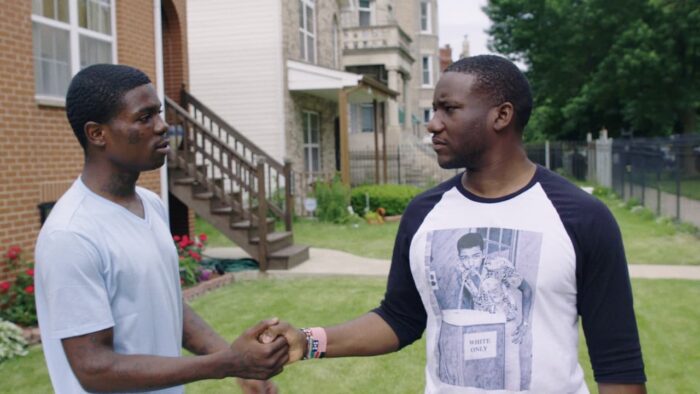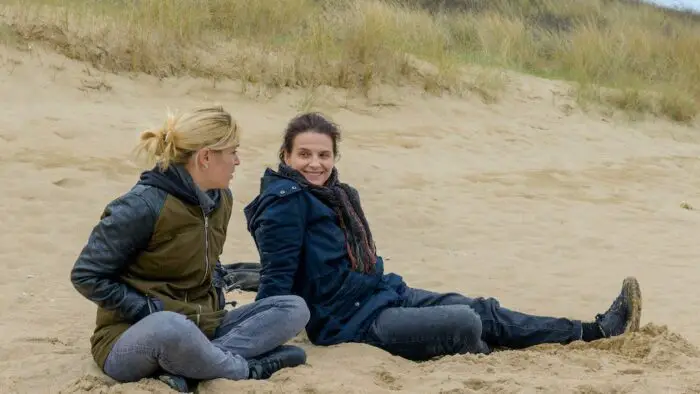This article is part of a series of pieces covering the films press-screened at the 2021 BFI London Film Festival; previous entries in this series are available on the site. Today we look at the documentary ‘All My Sons’ and the class drama ‘Between Two Worlds’.
All These Sons

I’m not a routine crier at the cinema, but I have my moments. One of the most notable of these was in 2018 when I went to see Bing Liu’s documentary Minding the Gap. I’d gone along to see what was gaining a documentary, nominally about skateboarding, such glowing praise and I soon found out. Minding the Gap made me cry five separate times throughout its ninety-minute runtime.
It was not, in fact, a documentary principally about skateboarding, any more than Hoop Dreams was about basketball. Both these documentaries are about working-class young men and their uncertain futures. As it went on, Minding the Gap became less about skateboarding and more about the impact of domestic violence upon young boys in shaping the men they grow up to become, and the film’s approach was so intimate, emotionally mature and knowledgeable that anything director Bing Liu did next went straight to the head of my watch list.
Three years later and his second feature film—this time sharing co-credit with Minding the Gap editor Joshua Altman—arrives at the London Film Festival. All These Sons has much in common with Minding the Gap, also focusing on Midwestern young men and their uncertain futures, but in this case, the future is a lot more imminent. These kids could die any day now. They’re the young men of South West Chicago, where, we are told, 2100 people were shot in the last year.
Also, like Minding the Gap, the film focuses on a particular trio: Shamont Slaughter, Zay Manning and Charles Woodhouse, as they try and escape lives of addiction, violence and hopelessness and become active members of their community through the mentorship of Billy Moore and Marshall Hutch, members of the MAAFA and IMAN projects to curb gun violence through education and community efforts, their mantra being: “people look at these young people as a problem, but they’re actually a solution if you give them a chance.”
MAAFA and IMAN work to give back to these young men the stake in society they’ve lost by having been indoctrinated into a culture of violence and despair, teaching them to recognise that conditioning and overcome it, to forgive one another and forgive themselves and to convince them the box that has been built for them is not where they belong. The film follows Moore and Hutch in their work as community leaders, confronting their own pasts and using their experience to instruct others, while also pointing up the structural and economic obstacles that create these cycles of violence in the first place.
The most compelling parts of the documentary, though, are those we spend with the young men themselves. All These Sons doesn’t have the shocks or the revelations of Minding the Gap, nor the emotional impact that film’s intimate and personal focus permitted it. However, that film’s ethos still comes across, and there are some brief moments when the gang are taken for a night out in D.C., free from local stresses and dangers, where the film recaptures some of the euphoria of that film’s sublime skateboarding scenes. Though it is a more orthodox documentary, that emotional expressiveness still comes across. It’s a genuinely powerful and uplifting look at men who’ve devoted their lives to educating the youth of America and collectively lift them out of poverty and violence. It’s inspiring in the more true and legitimate sense.
Between Two Worlds

“But still you’ll never get it right
‘Cos when you’re laying in bed at night
Watching roaches climb the wall
If you called your dad he could stop it all” – Pulp, “Common People”
We’ve all heard of this kind of thing, the journalist who goes undercover as a victim of poverty in order to feel what it’s really like; living homeless for a week in order to feel someone else’s pain. Such is the case with the protagonist of Between Two Worlds, Marianne Winkler, based on Florence Aubenas, a novelist who puts together a fake CV and gets herself a job as a cleaner, compensation for her own lack of imagination (this is apparently a grown woman who needs on the job experience to know you need to tie your hair back when cleaning a toilet) or willingness to be open and honest with people; after all, isn’t this what interviews are for? If you want to know what someone’s life is like, why not just ask them?
Except, of course, this kind of journalism lets you think you know what’s going on, without having to actually listen to a ‘poor’ person try to express themselves in their vulgar, “never-went-to-university” way. After all, who could feel sympathy for someone when wading through that many grammatical errors? Surely someone who is college-educated and has done this type of thing on their gap year can convey the plight of the proletarian better than a less well-read person who has lived paycheck to paycheck their whole lives?
I understand that this film is aware of the issues with this sort of journalism, but it doesn’t actually manage to say anything that critical in either direction, making you wonder what the point even was, if not to uncritically engage in poverty tourism. The film mostly unfolds as a drama where the main conflict is Marianne’s efforts to keep her identity a secret. The film seems shockingly uninterested in the systemic and economic injustices she purportedly set out to uncover and seems far more invested in their culture clash and the fun hi-jinks she gets up to with her new colleagues. I didn’t buy many of these scenes, and as far as exploring any of the political and economic issues at play, it’s as shallow, insincere and toothless as one would expect.
As her research goes on, Marianne meets Chrystele (Helene Lambert) at the employment agency, where she’s fighting an uphill battle to get her claim honoured while putting in the hours housekeeping on a ferry and raising three kids. It’s a scene distantly evocative of the scene in I, Daniel Blake where Daniel first meets Katie and intervenes on her behalf, though the comparison does this film few favours. Marianne decides Chrystele should be her case study and gets a job on her team to spend time and make friends with her. The two develop a fun, chummy dynamic and the film is watchable, with its dash of glamour and mischief to make all this poverty go down a little easier, but there’s just nothing to learn from it. It all feels very sanitary and cursory.
For a much more interesting take on these ideas of falsehood and living a double life as literary fiction, as well as the ethical pitfalls of such a scenario, watch JT Leroy, and for an accurate and purposeful take on capitalism’s exploitation of the working class, start with The Ragged Trousered Philanthropists and work your way up. This just doesn’t have anything to say except about its own guilty privilege and not even anything perceptive or essential about that. If you’re comfortably off and wish to help others stuck in a bad situation, you have to be an honest actor or you won’t help change anything. That might even be the exact message this film was trying to get across, but if so, it absolutely failed by whispering its virtues and shouting its faults.
I’ve usually had a lot of positive things to say about the movies of this festival, sometimes not as much as I’d have liked, but I at least felt each film had a sense of purpose. I see what drove the filmmakers to feel like theirs was a film that needed to be made, and that had to be told. With Between Two Worlds though, I’m at a loss. It’s palpably insincere, middle class and patronising in all the ways journalism of this sort always is. Perhaps it’s trying to start that very debate, but for my money, the jury’s been in for a long time now.



